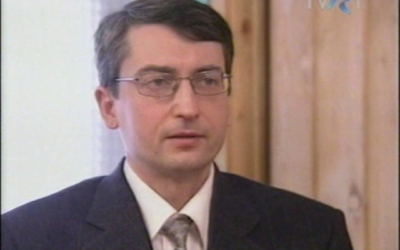Author: Calistrat M. Atudorei – 09/08/2019
The Reorientation of the European Union
European Union leaders began to realize that Europe cannot afford to become a battlefield during the New Cold war between America, on the one hand, and Russia, China and Iran on the other. It is relevant to notice the constant divergence of the EU towards America in the UN General Assembly. The most recent example was the decision taken by 22 EU Member States to condemn the Trump public administration to support the illegal annexation by Israel of Golan Heights in March 2019. It is also the fact that commercial transactions of the European countries with Russia, China and even with Iran are, despite Washington’s menaces, more likely to be far more convenient than US offers. That is why the EU refused to follow Trump in withdrawing from the international nuclear agreement with Iran. Also, to the open dissatisfaction of European officials, the US raised prices for steel and aluminum imports for the countries of Europe (but also for Canada and Mexico).
The sensitivity of the European leaders towards the United States’ decision to withdraw from possible commercial relations with Russia and Iran is also due to the vulnerability of the big European companies in the energy sector. Germany, France, the UK and Italy have two main sources of oil and gas: Russia and Iran. And the US wants to block both of them. Without these resources, large European corporations such as Peugeot, Citroen, Royal Dutch Shell, Total, Uniper or Wintershall would be as “unplugged.” Following the development in recent years of the exploitation technology of shale hydrocarbons, government officials in the United States now aspire to replace the supply of Russian gas to Europe with liquefied natural gas (LNG) from America. They have already invested in LNG export and storage terminals, and Europe would be a good and reliable place to sell. To eliminate Russian competition, Washington uses all methods: from diplomatic suggestions to strategic explanations or, if Europeans still don’t grasp the idea, economic sanctions may follow. AFP announced in February 2019 that Secretary of State Mike Pompeo declared that “President Trump has been very clear that America is going to do what it can within its power”[1] to stop Russia’s Nord Stream 2 gas pipeline to Europe. However, it is obvious that the relationship between Germany and the Russian Federation is substantially strengthening, and Germany is not willing to give up—despite US pressure—massive imports of natural gas coming from Russia. At the end of 2018, 60% of the natural gas used by Germany comes from Russia, and since the end of 2019, once the Nord Stream 2 pipeline becomes operational, the proportion will increase further, according to already established German-Russian agreements.
Given that Germany is the world’s fourth most powerful economy—after the US, China and Japan—it seems that the Germans have begun to behave manifesting a sort of aversion to US tutelage. As reported by a recent study conducted by Atlantik-Bruecke and the Civey Institute for public survey, “Nearly 85 percent of Germans have a negative or very negative view of U.S.-German relations.”[2]
On his turn, French president Emanuel Macron haven’t been shy at all to foreshadow in August 2018 a new orientation of Europe, insisting that “we need to build a strategic partnership with Russia and Turkey, because they are two important powers for our collective security, because they must be tied to Europe”.[3] Backed by Merkel, Macron stated he wishes a “sovereign Europe” which has “a true European army” and that eventually defends by itself. Not just against Russia or China, but “even against the United States of America.”[4]
Macron’s allegations correlate with the establishment in 2017 of a European military structure, the Permanent Structured Cooperation (PESCO), operating in the area of security and defense policy. PESCO has been established by a EU Council decision on 11 December 2017, with 25 EU Member States participating.
It is not surprising in this context that the constant insistence from America for all the European members of the North Atlantic Alliance to increase their contribution to NATO’s military spending is viewed with some suspicion.
Above all, the determination of the White House to achieve its objectives leads to more and more transparent pressures on important leaders of EU structures in order to persuade them to adopt policies favorable to the interests of Washington. The director of the European Council on Foreign Relations (ECFR), Mark Leonard, described[5] with sufficient details in October 2018 that US representatives did not hesitate to threaten with specific sanctions on civil servants with key roles in EU councils, major EU officials, SWIFT [6] directors and, apparently, even the directors of the European Investment Bank (EIB). According to the director of the ECFR, there were most likely threats for the directors of the Federal Reserve Bank of Germany (Bundesbank), the Central Bank of France and the European Central Bank.
German Foreign Affairs minister Heiko Maas is no longer hiding the antipathy he developed against the United States administration. In an article published by the Handelsblatt daily, Maas wrote that “Germany now sees the current trans-Atlantic antipathy as a historic opportunity to redefine the EU’s role.” Taking a step further in this direction, he also recommends some concrete measures: “It is therefore essential that we strengthen European autonomy by establishing payment channels independent of the US, a European Monetary Fund and an independent SWIFT [payments] system.”[7]
It is necessary to point out here that although the leaders of France, Germany or Brussels speak for the whole of Europe, their legitimacy in front of the peoples of the Old Continent suffers considerable depreciation. This is because they have a federalist agenda regarding the States of Europe, which are thus in danger of losing their national sovereignty. This is the basic reason for Brexit. And Trump Administration knows this and insists to the maximum on supporting dissidence in the EU. Political trends that struggle to maintain national identity (and opposing artificially created Muslim immigrant waves) are clearly on the rise, including Europe’s richest countries. Against this backdrop, it is possible that in the coming years there will be a slow down on the “progressive” (neo-Marxist) plans induced from Brussels to all the states of Europe. At the same time, considering the US domineering policies, it is possible to emerge, seemingly paradoxically, a growing openness to the cooperation alternatives offered by the Russian Federation and a cooling down to the expansionist and war-like policies imposed by the United States through NATO.
- AFP, Backed by Poland, Pompeo vows to try to stop Russia pipeline, France 24, February 12, 2019
- Andrea Shalal, Nicht gut: Nearly 85 percent of Germans see U.S-German ties as negative, Reuters, 8 februarie 2019
- Andrew Rettman, EU needs to stand apart from US, France and Germany say, EUObserver, 28 august 2018
- Nicholas Vinocur, Paul Dallison, Donald Trump: Without the US, the French would be speaking German, Politico, November 13, 2018
- Mark Leonard, The New Tyranny of the Dollar, Project Syndicate, October 30, 2018
- SWIFT – The acronim from Society for Worlwide Interbank Financial Telecommunication
- Heiko Maas, Making plans for a new world order, Handelsblatt, august 22, 2018
The above article constitutes a paragraph of the coming English version of Calistrat M. Atudorei’s book: Planurile Americii Pentru Hegemonia Mondiala (America’s Plans for World Hegemony)

This article is published within the Platform Europe Project
Previous contributions:
Andrey Kortunov: What Kind of Europe Does Russia Need?
Côme Carpentier de Gourdon: For a New Alliance among European Countries
Alexey Gromyko: Political Landscape of Europe. The Spectre of Geopolitical Solitude
Iurie Roșca: Towards Continental Unity
Walter Schwimmer: The Future of Europe
Vincenzo Maddaloni: L’onda dei salvinisti frantuma l’unità dell’europa
Anis H. Bajrektarević: Europe – the letzte Mensch or Übermensch, the new Byzantium or declining Rome
Vladimir Kulikov: Accepting locality as a global trend: implications for Europe
Giovanni Saccà: L’importanza e la necessità delle grandi infrastrutture europee
Chiara Saraceno: L’importanza di una Unione Europea Sociale
Maria Grazia Melchionni: Looking ahead and beyond for Europe
Andrey Kortunov: Europa imprevedibile
Franco Cardini: Per un sovranismo europeista
Laura Garavini: Intervista sull’Europa
Alexander Rahr: L’Europa, la Russia e il mondo che verrà
Cesare Ciocca La dimensione marittima dell’Unione Europea
AntonGiulio De’ Robertis: The Lost Soul of Europe
Adolfo Morganti: La battaglia delle parole e il futuro dell’Europa unita
Andrey Kortunov: L’Unione Europea e il vento dell’Est
Mark Entin, Ekaterina Entina: Russia, the Council of Europe and the Future of European Politics
Fabrizio Noli: L’Unione Europea. Un grande avvenire dietro le spalle
Thierry Meyssan: The European Union, in the moment and in the long run
Lamberto Zannier: Strengthening cohesion of societies: a new methodology to prevent crises and conflict
Marco Tarchi: Per resistere allo spirito del tempo
Giuseppe Gagliano: Una visione strategica per l’Europa
Giuseppe Romeo: Ombre russe e lanterne cinesi

Calistrat M. Atudorei, romanian political scientist. His last work is: Planurile Americii Pentru Hegemonia Mondiala: Studiu, 2018
Calistrat Atudorei was born in Bacău, Romania, on March 4, 1968. He studied technical disciplines at “Gheorghe Asachi” University in Iași and worked for a period as engineer. For about ten years he collaborated with several human rights organizations and turned his interest to social sciences. Currently he is a PhD student at the Faculty of Philosophy at the University of Bucharest, where he focus on the field of International Relations.
He published articles related to social sciences in magazines and specialized sites in Romania, such as Lumea, the website of the Union of Professional Journalists or ActiveNews.
